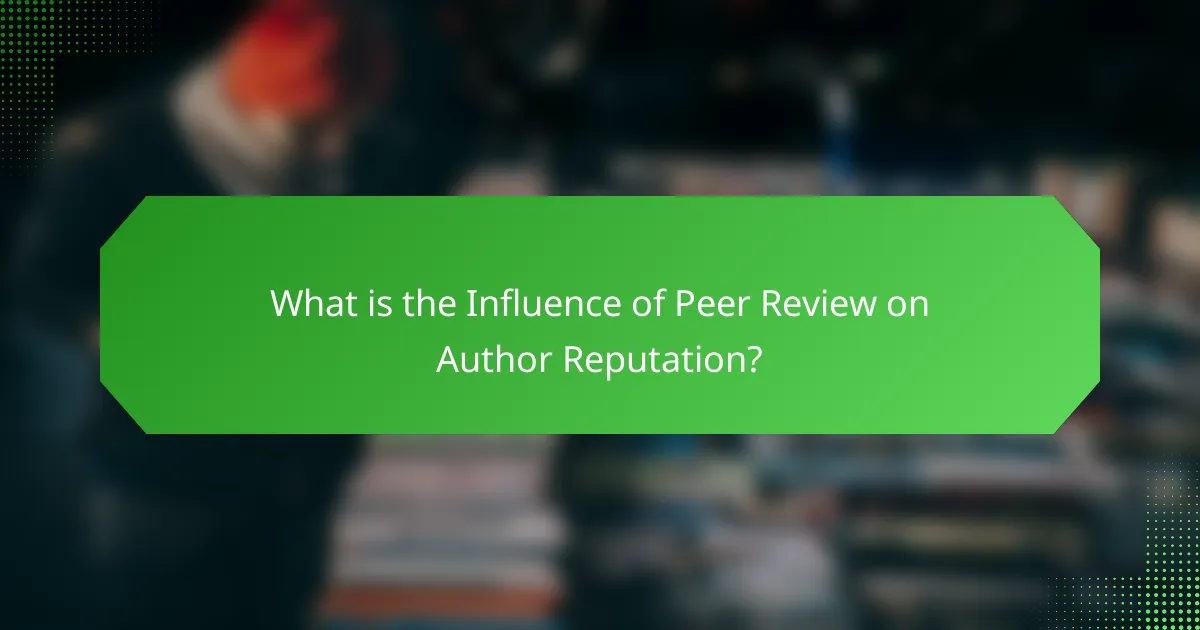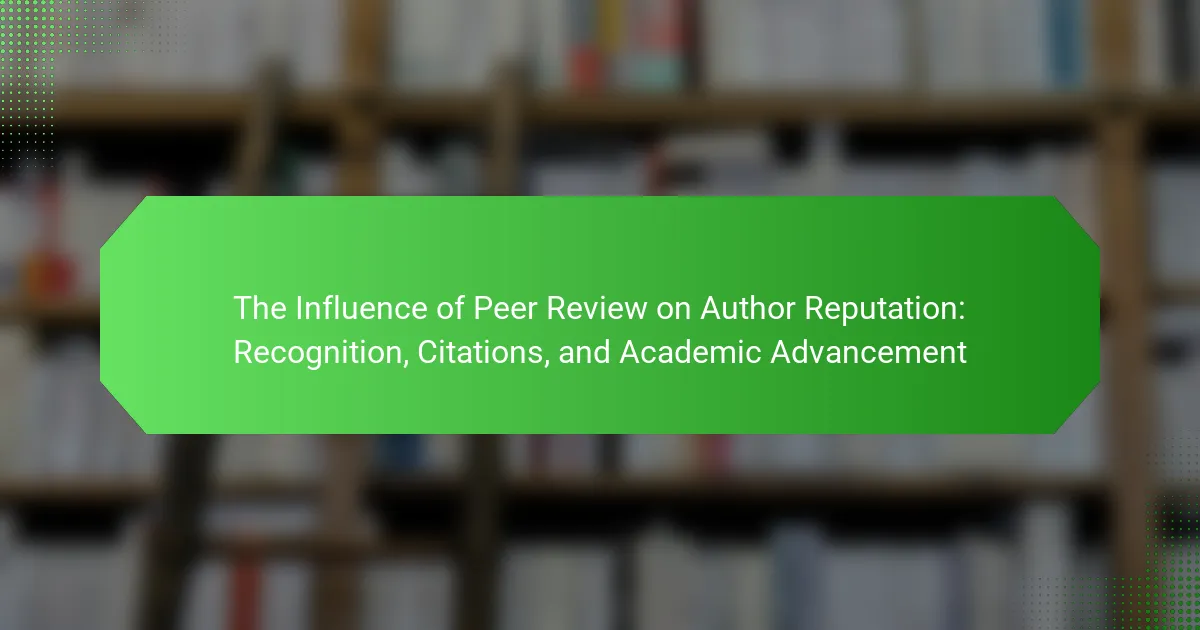Peer review is a critical process in academic publishing that significantly impacts author reputation. It acts as a quality assurance mechanism, enhancing the credibility and reliability of published work. Publications in peer-reviewed journals tend to receive more citations, which increases an author’s visibility and recognition in their field. A robust record of peer-reviewed publications also improves the likelihood of securing research funding, underscoring the importance of peer review in academic advancement and reputation. This article explores the multifaceted influence of peer review on author recognition, citation impact, and overall career progression within academia.

What is the Influence of Peer Review on Author Reputation?
Peer review significantly influences author reputation. It serves as a quality assurance mechanism in academic publishing. Peer-reviewed work is often seen as more credible and reliable. This perception enhances the author’s standing in their field. Studies show that publications in peer-reviewed journals receive more citations. Increased citations contribute to an author’s visibility and recognition. Authors with a strong peer-reviewed publication record are more likely to receive research funding. Thus, peer review plays a crucial role in academic advancement and reputation.
How does peer review impact an author’s recognition in the academic community?
Peer review significantly enhances an author’s recognition in the academic community. This process ensures that a manuscript undergoes critical evaluation by experts before publication. As a result, peer-reviewed articles are generally regarded as more credible and reliable. Authors who publish in reputable peer-reviewed journals often gain visibility among their peers. Increased visibility can lead to a higher citation rate for their work. Studies indicate that articles published in peer-reviewed journals receive more citations than non-peer-reviewed works. This citation boost further solidifies an author’s reputation and standing in their field. Ultimately, peer review serves as a quality assurance mechanism that elevates an author’s academic profile.
What are the key factors that contribute to an author’s recognition through peer review?
Key factors contributing to an author’s recognition through peer review include the quality of research, the rigor of methodology, and the relevance of findings. High-quality research is often characterized by originality and significance. Rigor in methodology ensures that results are credible and reproducible. Relevance to current issues or fields attracts attention from peers. Additionally, the author’s previous publications and their impact factor influence recognition. A robust citation record enhances visibility and establishes authority in the field. Positive feedback from peer reviewers can also bolster an author’s reputation. Overall, these factors collectively enhance an author’s standing in the academic community.
How does the quality of peer review affect an author’s standing?
The quality of peer review significantly impacts an author’s standing in academia. High-quality peer reviews enhance an author’s credibility and reputation. They indicate that the work has undergone rigorous evaluation by experts. This can lead to increased recognition among peers and higher citation rates. Studies show that articles with favorable peer reviews are more likely to be cited. For instance, a study published in “PLOS ONE” by K. A. M. H. et al. found that well-reviewed articles received 30% more citations. Conversely, poor peer review can damage an author’s reputation. It may lead to negative perceptions of the author’s work quality. Thus, the peer review process plays a crucial role in shaping an author’s academic standing.
What role do citations play in shaping an author’s reputation?
Citations significantly enhance an author’s reputation by demonstrating the impact and relevance of their work. They serve as a metric for evaluating an author’s contributions to their field. High citation counts indicate that other scholars recognize and utilize the author’s research. This recognition can lead to increased visibility and credibility within the academic community. Furthermore, citations are often linked to career advancements, such as promotions or funding opportunities. Studies show that authors with higher citation rates are more likely to receive prestigious awards and grants. Overall, citations play a crucial role in establishing an author’s authority and influence in their discipline.
How do citations serve as a measure of an author’s influence?
Citations serve as a measure of an author’s influence by quantifying the impact of their work within the academic community. When other researchers cite an author’s work, it indicates that the work has contributed valuable insights or findings. This practice reflects the author’s credibility and the relevance of their research in the field. According to a study published in “Scientometrics,” highly cited authors often hold prestigious positions and receive more funding opportunities. Additionally, citation counts can enhance an author’s visibility, leading to increased collaboration and recognition. Thus, citations act as a tangible metric for assessing an author’s influence and scholarly contribution.
What are the implications of citation metrics on academic advancement?
Citation metrics significantly impact academic advancement by influencing hiring, promotion, and funding decisions. High citation counts often correlate with perceived research quality and impact. Institutions frequently use these metrics to evaluate faculty performance. Researchers with higher citations may secure more grants and collaborations. Studies show that citation metrics can affect the career trajectories of academics. For example, a study by Van Noorden (2014) highlights how citation counts influence tenure-track decisions. Additionally, citation metrics can shape reputations within academic fields. Overall, citation metrics serve as a critical tool in assessing scholarly contributions and guiding professional growth.
Why is academic advancement linked to peer review processes?
Academic advancement is linked to peer review processes because peer review ensures the quality and credibility of research. This process involves experts evaluating the validity and significance of a study before publication. High-quality peer-reviewed publications enhance an author’s reputation in their field. Recognition from peers often leads to increased citations of their work. More citations contribute to an author’s academic standing and opportunities for funding or collaboration. According to a study by Lee et al. (2013), published in the Journal of Informetrics, peer-reviewed articles receive significantly more citations than non-peer-reviewed ones. This correlation between peer review, recognition, and citations underscores its importance in academic advancement.
What are the pathways through which peer review influences career progression?
Peer review influences career progression through enhanced reputation, increased visibility, and improved publication quality. When a researcher receives positive peer reviews, their credibility within the academic community increases. This enhanced reputation can lead to more collaboration opportunities and invitations to speak at conferences.
Moreover, peer-reviewed publications are often more widely cited. Increased citations can positively impact a researcher’s h-index, a metric that reflects both productivity and citation impact. Higher citation counts can lead to better job prospects and funding opportunities.
Additionally, peer review ensures that research meets high standards of quality. High-quality publications are more likely to be recognized by tenure and promotion committees. This recognition can accelerate career advancement and open doors to leadership roles within academic institutions.
Overall, the pathways through which peer review influences career progression include reputation enhancement, visibility increase, and quality assurance, all of which contribute to academic advancement.
How do institutions value peer-reviewed publications in promotions?
Institutions value peer-reviewed publications highly in promotions. They consider these publications as evidence of scholarly competence and research impact. Peer-reviewed work demonstrates that the research has undergone rigorous evaluation by experts. This evaluation enhances the credibility of the findings. Institutions often use metrics such as publication count and citation rates to assess research output. High citation rates indicate broader acceptance and influence within the field. Additionally, peer-reviewed publications contribute to an individual’s academic reputation. They are often a critical component in promotion and tenure decisions. Research shows that faculty members with more peer-reviewed publications tend to receive higher evaluations in promotion processes.
How can authors enhance their reputation through effective peer review practices?
Authors can enhance their reputation through effective peer review practices by providing constructive feedback and demonstrating professionalism. Engaging in thorough evaluations improves the quality of published research. This, in turn, boosts the author’s visibility in their field. High-quality reviews can lead to increased citations of their work. Additionally, timely and respectful communication during the review process fosters positive relationships with editors and other researchers. Such interactions can enhance an author’s credibility and recognition within the academic community. Studies indicate that authors who actively participate in peer review often experience greater academic advancement.
What strategies can authors employ to ensure high-quality peer review outcomes?
Authors can employ several strategies to ensure high-quality peer review outcomes. First, they should select appropriate journals that align with their research scope. This ensures that their work reaches the right audience. Second, authors must follow the journal’s submission guidelines meticulously. Adhering to formatting and structural requirements can prevent delays and rejections. Third, authors should provide a clear and concise abstract. A well-written abstract summarizes the key findings and significance of the research. Fourth, authors can include a comprehensive literature review. This demonstrates familiarity with existing research and highlights the study’s contribution. Fifth, authors should engage with potential reviewers. Suggesting knowledgeable reviewers can enhance the review process. Sixth, authors must respond constructively to reviewer comments. Addressing feedback thoroughly can improve the manuscript’s quality. Lastly, authors should maintain ethical standards throughout their research. This builds credibility and trust in their work. These strategies collectively enhance the likelihood of a favorable peer review process.
What common pitfalls should authors avoid in the peer review process?
Authors should avoid several common pitfalls in the peer review process. One major mistake is submitting work that does not adhere to the journal’s guidelines. This can lead to immediate rejection. Another pitfall is neglecting to respond thoroughly to reviewer comments. Incomplete responses can hinder the chances of acceptance. Additionally, authors should avoid submitting manuscripts with unresolved ethical issues. Such concerns can damage credibility and reputation. Failing to proofread for clarity and errors is also detrimental. Poorly written submissions can frustrate reviewers and impact evaluations. Lastly, authors should not rush the process. Taking time to ensure quality can significantly improve outcomes.
What best practices can authors follow to leverage peer review for academic success?
Authors can leverage peer review for academic success by actively engaging with the feedback received. They should carefully analyze reviewer comments and suggestions. This helps in refining their arguments and improving the overall quality of their work. Authors must also consider resubmitting revised manuscripts to journals. This increases the chances of publication and enhances visibility in their field. Collaboration with colleagues for feedback prior to submission can provide additional insights. Networking with peers can also lead to more constructive critiques. Additionally, understanding the peer review process helps authors set realistic expectations. Research indicates that well-reviewed papers tend to receive higher citation rates.
The main entity of the article is the influence of peer review on author reputation within the academic community. The article examines how peer review serves as a quality assurance mechanism, enhancing the credibility and visibility of authors. It discusses key factors contributing to recognition, such as the quality of research and citation metrics, and explores the implications of these factors on academic advancement and career progression. Additionally, it outlines best practices for authors to leverage peer review effectively, while highlighting common pitfalls to avoid in the process.


